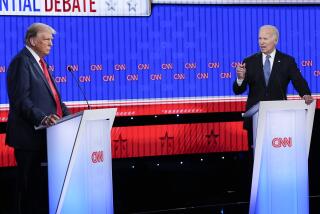Clinton Meets Business Chiefs on Global Warming
- Share via
WASHINGTON — President Clinton reached out to key companies Monday to hear their views on the debate on how to cut pollution to stem global warming.
The White House invited 10 chief executives of utility, oil, gas, steel, chemical, manufacturing and financial service companies to discuss their views on what the U.S. position should be in international talks for a climate treaty due to be signed in Kyoto, Japan, in December.
“It was a very good, serious meeting,” White House Press Secretary Mike McCurry said.
The 10 business leaders, who were all unreachable for comment afterward, focused on pollution “credit” trading as a way to cut emissions and on policies to help developing countries curb pollution, McCurry said. The Clinton administration has proposed setting emission budgets and letting companies that pollute less sell credits to companies that emit too much.
“I believe there should be realistic but binding limits to emissions of greenhouse gases,” Clinton said at the beginning of the meeting, adding that there was “pretty clear evidence that the climate is changing.”
The executives expressed some skepticism of the nature and amount of research on the climatological effect of greenhouse gases, McCurry said, “and what it suggests by way of a policy response.”
There was “some agreement that there should be further science done,” McCurry said. “The administration does not object to that, even though the president, as he told you, considers the science compelling.”
The administration has been slow to take a specific position on the issue, and businesses and conservative lawmakers have warned that emissions limits could cost jobs.
Clinton said he is trying to find a way to combat the problem without harming the economy or pushing the United States from “the forefront of what is now a $400-billion market for environmental technologies.”
Under pressure from industry groups, the Senate 10 days ago passed a resolution urging the administration to reject any treaty that does not commit developing countries to cutting their emissions, even though the industrialized countries have caused most of the world’s pollution.
Companies fear that they will be at a disadvantage if only industrialized countries have to control their pollution.
“I think all nations, developed and developing, should be a part of this,” Clinton said. But under the terms for the Kyoto negotiations, industrialized countries agreed that the treaty should only set binding targets on the rich nations.
Companies represented at the meeting were Aluminum Co. of America; American Electric Power Co.; Bethlehem Steel Corp.; British Petroleum Co.; PacifiCorp power company; Enron Corp., an oil and gas company; FMC Corp., a chemical and industrial equipment manufacturer; Georgia-Pacific Corp., a forestry product company; Honeywell Inc., a technology manufacturer; and Salomon Inc., an investment banking firm.
The group did not include many of the hard-line companies opposed to any treaty that would set strict limits on emissions of heat-trapping gases.
More to Read
Inside the business of entertainment
The Wide Shot brings you news, analysis and insights on everything from streaming wars to production — and what it all means for the future.
You may occasionally receive promotional content from the Los Angeles Times.










